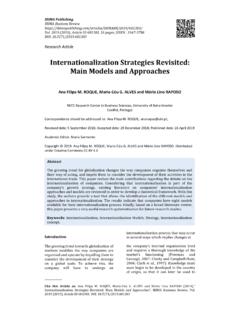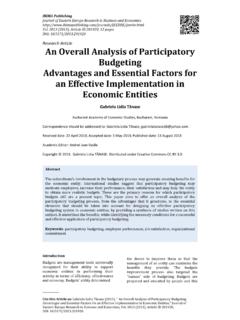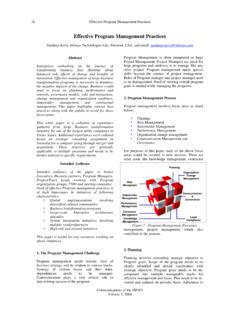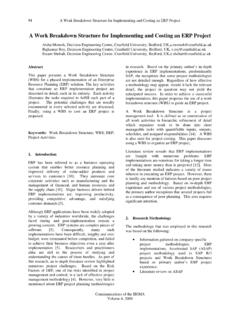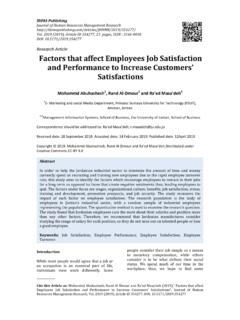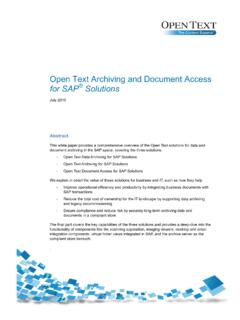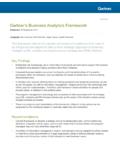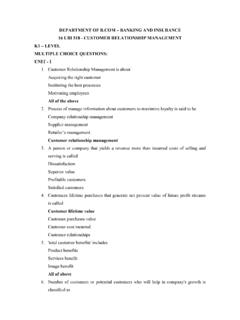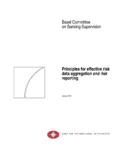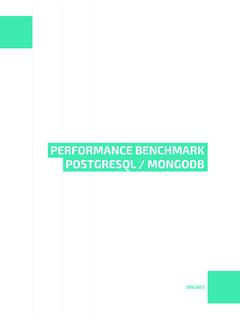Transcription of Effective Program Management Practices
1 Effective Program Management Practices Communications of the IBIMA Volume 5, 2008 16 cRisk ManagmentStakeholderManagementPerformanc eManagementContractorManagementOrganizat ionChangeManagementCommunication &GovernancePlanningKnowledgeManagementLe gal Compliance Effective Program Management Practices Sandeep Savla, Infosys Technologies Ltd., Fremont, USA, and email: Abstract Enterprises embarking on the journey of transforming business face dilemma about balanced risk, effects of change and benefits of innovation.
2 Effective Management of large business transformation programs is necessary to minimize the negative impacts of the change. Business would need to focus on planning, performance and controls, governance models, risks and mitigations, change Management and organization readiness, stakeholder Management and contractual Management . This paper highlights various best Practices along with the pitfalls to avoid for these focus areas. This white paper is a collation of experience gathered from large Business transformation initiative for one of the largest utility companies in Unites States.
3 Additional experiences were collated based on strategic consulting assignment in Australia for a company going through merger and acquisition. These Practices are generally applicable to multiple programs and needs to be further tailored to specific requirements. Intended Audience Intended audience of the paper is Senior Executives, Business partners, Program Managers, Project/Track Leads working with Program organization groups, PMO and steering committee. Need of Effective Program Management Practices is of high importance in initiatives of following characteristics: Global implementations involving diversified cultural communities Business transformation programs Large-scale Enterprise architecture upgrades System Integration initiatives involving multiple vendors/partners High risk and reward initiatives This paper is useful for any resources working on above initiatives.
4 1. The Program Management Challenge Program Management needs holistic view of business strategy and its relation to various tracks. Synergy of various teams and their inter-dependencies needs to be managed. Communication plays a very critical role in determining success of the Program . Program Management is often interpreted as large Project Management . Project Managers are hired for large programs and tendency is to manage like any other project. Program Management needs special skills beyond the science of project Management .
5 Roles of Program manager and project manager need to be distinguished. Need of viewing overall Program goals is needed while managing the programs . 2. Program Management Process Program Management involves focus areas as listed below: Planning Risk Management Stakeholder Management Performance Management Organization change Management Communication Management and Governance For purposes of this paper, each of the above focus areas would be covered in next sections. There are other areas like knowledge Management , contractor Management , project Management which also contribute to the process.
6 3. Planning Planning involves converting strategic objective to Program goals. Scope of the Program needs to be clearly identified and should synchronize with strategic objective. Program goals needs to be de-composed into multiple manageable tracks for Effective Management and focus. Plan needs to be re-visited and updated on periodic basis. Adherence to Figure 1 : Program Management Processes Sandeep Savla Communications of the IBIMA Volume 5, 2008 17 Minor Serious Severe Major CatastrophicAlmost CertainLikelyPossibleUnlikelyRareExtreme HighSignificantModerateLowMitigation action neededManage carefullyManage routinelyLegendProbabilitySeverityEscala te to Steering committeeImmediate action plan neededplan ensures predictability in outcomes.
7 Best Practices : For Effective Planning, some of the best Practices include: Create Program charter to help provide direction, scope and Program objectives. Constraints, resources, skills needed, dependencies, assumptions, risks, methodology, implementation plan, control metrics needs to be documented and communicated. Organization policies and procedures need to be reviewed to ensure that any Practices being implemented are not in conflict with norms of the organization. Pitfalls to Avoid: Program manager should be aware about following pitfalls to avoid: It is assumed that Program Management plan is tool for Program leads.
8 Each of the sections in the plan has potential impact to various stakeholders and hence needs to be communicated to larger audience. Plan is not baselined or signed off allowing for constant changes. Managing scope changes is critical for success of the Program . It is assumed that Program plan is static and is needed only for documentation purposes. Lessons learnt from various life cycles are Effective input for periodically revising the plan. 4. Risk Management Deviations from desired output need to be managed by strong risk Management activities.
9 All risks needs to be identified, analyzed and mitigated to increase the probability of success for the Program . Addressing risks helps in preventing surprises. Best Practices : For Effective Risk Management , some of the best Practices include: Enable Risk scoring framework to effectively measure the exposure of risks with respect to probability, impact and costs of mitigation. Risk scoring also helps to escalate high risks to steering committee for further action. Refer Figure 2. Factor the risks (and rewards) in estimation models while working on programs .
10 Identify risk triggers to take proactive action. Pitfalls to Avoid: Program manager should be aware about following pitfalls to avoid: Program manager should take input from all stakeholders along with review of historical risk logs. There is tendency to cloud the real risks by unilaterally managing risks based on own experience. Prepare Risk Management plan at start of the Program . Risk Management needs periodic monitoring as there are high chances that impact and probability of risks change over different tracks and life cycles in the Program .
